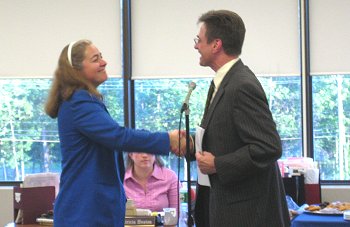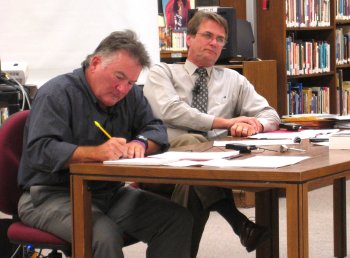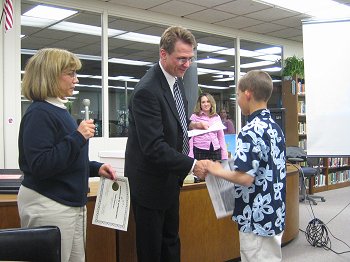- By Dan Veaner
- News
 Print
Print  Mark Lewis
Mark LewisMark Lewis
The Lansing Star sat down with Lewis in his office Tuesday to talk about his tenure here and his take on lessons he and the community could learn from the experience. With an interim superintendent named, and only one more school board meeting to go, he was relaxed, forthcoming, and looking forward to the next stage in his life. He and his wife Liz have moved to Syracuse, where she will finish an advanced education degree in April.
Lansing Star: Let's start with the tough question: why are you leaving?
Mark Lewis: Well, a combination of personal and professional factors entered into that. The primary one being is that my wife is done at Syracuse. She will graduate in April and we had commenced a discussion on what that held for me as superintendent of Lansing, and it became clear to both of us that this is probably going to be at best a three to four year position and then move on.
So that was our goal. But professionally speaking though, there are a certain number of disappointments and frustrations that occurred during my tenure here. I would go home and ask myself do I have the attributes that are needed to push this school district forward. And to often I came up with the answer no.
The chemistry wasn't right, it was like stepping on to a spinning wheel from the start with the construction project. I didn't have the opportunity to really immerse myself into the community and be able to get a sense of the prevailing culture here and the cultural assumptions that underpin what we observe here and what we see. It was just off and running on the construction project that I naively thought was going to be a very positive endeavor because it had been in all my previous assignments where I would bring in facilities, committees, and work with them with the goal of developing a construction project.

Congratulating HS French and Spanish Teacher Sherry Kadlec on receiving tenure
So I was somewhat taken aback when we started that process and I was under attack. It was kind of incredulous to me why they were doing it when I was only here three or four weeks, five or six tops. I was handed a construction project to develop. So that kind of took on a life of its own in terms of I think an aura around this office that was created, an aura of distrust, a lack of credibility, and I think that those individuals who wanted to perpetuate that would never let up and kept throwing gasoline on the fire.
It kind of spread out into other areas and of the operation and when you're plagued with that type of a dynamic then you get to feel like you're pushing a boulder up hill. You've heard me say that on a number of occasions so I felt like I was Sisyphus.
I'm in this profession to change things for the better for kids. At the end of the day when I would look back on those days, the weeks, and the months that I was in this position, I really couldn't put my finger on a lot of change in that regard. So I started questioning whether it would be better for me and better for the district for me to make a decision to move on and have somebody else come in that may not be handed the construction project, and may have stability in the building ranks in terms of principals because we do have three grade principals in the buildings now.
I had to re-staff two of those buildings during my time here and I had to re-staff the business administrator position, and I had to staff the director of curriculum. In addition to the construction project and the first year's budget which I think the problems associated with first year budget in part kind of was a bleed-over phenomena from the whole construction project process.
| What's Next For Lansing Schools? With school starting less than a month from now, Lansing will need someone to administer the district. The top three administrators will all be gone on September 1st. So what is in store for the near future? Interim administrators will fill at least some of the gaps while the Board Of Education searches for new permanent replacements. Tom Helmer starts next Monday as Interim Superintendent to insure a full two weeks for the transition before Mark Lewis leaves. Dave Klem will become Interim District Business Administrator when Larry Lawrence leaves that position in two weeks. The Board Of Education is already beginning the process of searching for permanent replacements. There is still some discussion about what the job description should be when replacing Director of Curriculum and Staff Development Deb Pichette. Defining the responsibilities of that job while facilitating the smooth running of the Technology Department, which Pichette also headed, without hiring a separate Director of Technology is one of the challenges the school board is currently wrestling with.  In other District administrative roles, Pam Dipaola continues as Director of Special Services and Grants, and Ed Redmond as High School Dean of Students and District Athletic Director. Elementary School Principal Chris Pettograsso started in that position this summer. She replaces Interim Principal Earlene Carr, who served at the elementary school for three years. Jamie Thomas begins his second year as Middle School Principal, while Michelle Stone starts her fifth year as Lansing High School Principal. | ||
ML: Yes. I conducted the interviews and I made recommendations to the board.
LS: One way in which I think you arguably made things better for kids is in the staffing of the middle school with a principal that seems to be well respected and liked by all of the factions including the kids. I know that because I have a child in that school. There hasn't been time to develop a history like that in our elementary school, but the indications are there's a good person there as well.
ML: I can't take credit for the changes that have occurred in the middle school, and I agree with you that there have been many, many positive changes in the middle school by virtue of Jamie Thomas' leadership. All I did was choreograph the selection process and make the recommendation to the board and work with Jamie on a regular basis. It's a joy to work with a guy like him. To see what he does for kids and the respect he has for teachers, support staff, and parents, I mean he's the right person for that building.
So I appreciate that accolade but it really goes to Jamie Thomas, not me. And Chris Pettograsso, similar, very positive selection process that resulted in everybody getting behind her as the person for the job, and the initial indications are she's going to be great in that building.
LS: Well, that's going to make it a sweep because I don't know of anybody who has any bad words to say about (High School Principal) Michelle Stone. She seems to be managing a very positive, forward looking approach in the high school where she's juggling a lot of things that she wouldn't necessarily be juggling elsewhere.
ML: Michelle is a proven leader and has done just an incredible job in the high school. Everybody highly respects her and rightfully so. Students respect her, teacher community, everybody. She does a great, great job.
I think perhaps Lansing's challenge is to keep her. When you have school leaders with those types of characteristics and those types of strengths in a short supply environment, you're going to have people calling her and there will be attempts of piracy that is running rampant now in the profession.
Eventually she will get a phone call that's kind of like the old godfather movies, they'll make her an offer she can't refuse because that's the name of the game today.
LS: That goes to one of the questions I wanted to ask you at the end of the interview. What advice would you have for the district that it could do things differently to try and keep a superintendent? I think this really speaks to all of the administrative positions including principals, because the district has a fairly clear record of not being too good at that. But at the same time there is a lot to recommend this district. Academically, we generally have a very good faculty. It shows in the results.
I think there is good leadership. Look at the test results that Michelle reported at the school board meeting. The low drop-out rate, the high rates of achievement, that's coming from somewhere. So how do we keep leaders here?
ML: Success in the arts, success in the interscholastic athletics, it's a phenomenal place for kids to come to school and I would love to be a teacher in this district. I often, when I walk into any of the buildings, I just think, "Gee whiz, I wish when I was in a classroom I would have been in an environment such as one of these buildings because it is great."
I think that this district has to be sensitive to the -- this district and every district. I don't want to single out Lansing -- but when I started as a superintendent 16 years ago the position was regarded, it was respected. The individual wasn't expected to be perfect, the individual had a higher degree of tolerance, perhaps, for divergent viewpoints of an individual coming in the door, people weren't so trigger happy and trying to snipe at the superintendent, and in short didn't enter the door with a target on his back.
I think in this day and age -- and I base this on my discussions with the myriad of colleagues I know across the state, and I have known them for years because I've been an administrator for 26 years so I know just about everybody in this state -- they all say the same things. We're not thin skinned, we're pretty thick skinned people, but we're here, we have an agenda for school improvement for kids, and if you have a target on your back you're always trying to negotiate and walk in the door and wonder who is going to snipe at you today because you have to deal with that before you can get to your agenda for change and working with teachers and working with parents on behalf of kids.
So that's constant noise that you have to deal with and it takes its toll in terms of frustration. Superintendents are highly motivated people. They crave, they have this appetite to see things change and improve for the teaching-learning process and if it can't be done, then they have a decision to make. That increases the frustration level dramatically.
That's what I saw here. The dynamic is alive and well here in Lansing.
LS: Some people have talked about the school board's responsibility for oversight of the administration -- having the responsibility to pay attention to what administrators are doing and to see that things are happening the way they should be happening. You're not saying that the school board shouldn't take that role, are you?
ML: The school board has one employee -- the Superintendent of Schools. Everybody in the school district reports to essentially the Superintendent of Schools. In smoothly running school districts, there is an understanding of the delineation of authority, and the board of education and the superintendent in those school districts work hard to make sure that they don't step on each other's toes. They do that through quarterly meetings. The old Ed Koch ‘How am I doing?' comment comes to mind, quarterly workshops where they look at the district goals and they look at the board's roles in pursuit of those goals, and they look at the superintendent's role and the pursuit of those goals.
That creates a higher level of confidence that things are going to get done, the superintendent's in charge. If there is an issue on behalf of the board, and the board is a collective body, board members do not act individually, but as a collective body. If the board of education has an issue with the superintendent of schools it should be dealt with behind closed doors in an executive session. And life goes on.
If the board decides that the superintendent isn't going in the right direction, then the board has options. The board can say ‘We're not renewing your contract. It's time to dust off your resume.' This board never did that to me. In fact we had a pretty good working relationship -- most of the board members, certainly not all of the members by any means.
But going back to your original question, boards and superintendents have to work hard to make sure that the delineation of authority is in place so that the superintendent knows what his responsibilities are and the board knows what their responsibilities are. Otherwise you get into that concept of micromanagement and if you look at the surveys of what frustrates superintendents the most is when boards of education micromanage. It's now salary, it's not public criticism, it's micromanaging boards of education.

Presenting a scholarship at 2007 commencement
LS: My impression over two years of covering the Lansing Board Of Education is that they have a tendency to micromanage. But my theory is that is because there has been such a revolving door in this office, that somebody has had to step in at times. And once you step in it's hard to step out.
I don't know whether my theory is right. What's your take on that?
ML: Why do people get on boards of education? They get on boards of education because they want the same things as superintendents do. They want to improve the school district. Yes, some, the minority of people, get on because they have an axe to grind. You see that in a lot of school districts, you see that here. There was one person on the board who had an axe to grind with me.
But in Lansing what has to change in my estimation is the board of education meeting process. As it is, anyone, any town's person at any particular time no matter what's going on at the board meeting, if I'm dialoging with the board of education around issues and we're discussing budget, we're discussing program, anybody can walk up to the microphone and participate. That is extremely damaging, I have never been in a place where that has been the case.
I queried my colleagues to see whether or not that goes on in their districts and they are just very surprised that that would occur. What it does is it places the superintendent between forces now. In other words I am no longer dialoging with the governing body of the district around issues, now I'm trying to negotiate with whatever is concerning the person standing at the microphone in addition to trying to have this discussion.
LS: Which you do in other venues but there is a time and place for everything?
ML: Absolutely. There is a time and place for everything and what really has to change is... what New York State School Board Association will say is that a board of education meetings are meetings held in public, they are not public meetings. These are not New England town meetings. They shouldn't be New England town meetings but they take on that flavor in this district all too often.
When we had the budget process we saw that, when we had the construction issue we saw that. When we had to cut staff that first year because of the defeated budget and we had the line of people at the microphone just laying criticism after criticism at me and at the administration and being entertained in the process of the board meeting. That's very damaging and if that's not checked, then I fear that we are going to see the progression of people coming in and out of this office.
LS: You mentioned Michelle possibly in the future getting an offer she couldn't refuse. I also have a theory about this: when you make the statements that people leave Lansing because there is something wrong with Lansing, some folks get very huffy about it and say, 'No this one left for personal reasons, this one was never going to stay, this one got a job that was their dream job', and so on. There is always a reason.
To which I reply, if there is a reason to stay, people will stay or may stay. Maybe it is an offer they can't refuse but maybe it isn't. If Michelle got a call like that what could the district do to keep her?
ML: Well it depends upon the nature of the offer from the other district and how appealing the other district is. I've been in those situations and the district that is recruiting always has, it has always been what they offer has been far more to go then it would be to stay in the previous district. Either in terms of environment or salary or combination of factors such as that or the opportunity.
Like when I went to Brewster... in the 7 years I was there, I had 15 administrators and I was told when I walked in the door over the next three years you will be able to develop your own team because everybody here is going to be retiring. I couldn't believe that. But guess what? Everybody retired. I hired all 15 of Brewster's administrators in the first three years. It was a real strong team. In the process thereafter I had to replace a couple of them but going forward that was a plus. I don't mean to digress here.
It depends upon too how desperate the recruiting school is. There are school districts out there. I remember my former board president in Brewster. He came in one day and he had this check and said, "How much do you need?" What he was saying was this check will pay for a lot of resources to improve our academic program. What's the price tag mark and let's work that out.
LS: You mean the price tag to keep you there or the price tag to spend it on the district?
ML: Both. I was getting six-month increments in my salary because that is a highly competitive area, Westchester Putnam County and there is piracy in the high seas there. The ante for superintendents just kept going up, and up, and up. If you wanted to keep a superintendent you had to have a mid-year review. That's going to be state wide, that's going to be nationally.
I wanted to mention something, though, on why people leave. There was a comment made that Lansing has very high expectations for its program and the people who lead those programs and sometimes people who come into this district find it too challenging and they leave. I absolutely reject and discount that. I have been in school districts whose expectations have been just as high if not higher than Lansing so that had nothing to do with my decision to leave.
I think it's an unfair statement to make. I think it was made about Larry too. That's not the case at all. Larry's leaving, and Larry professed why he was leaving. He's leaving because he didn't feel he got a very good welcome here. They, and that's a faceless they, not the board by any means. He wasn't allowed to get his feet on the ground although he tried and he tried to establish relationships here and he was establishing them very well but he just got the feeling that he wasn't respected by this community.

With Larry Lawrence (left) at a School Board Meeting
LS: I had the sense that he was in the unfortunate position of being the messenger that everybody wants to shoot.
ML: Absolutely.
LS: He brought a lot of bad news that came from years before he came to Lansing.
ML: That plus he had to fix a lot of things as he came in the door here. He was in the process of fixing them but unfortunately there is a retired administrator -- not Ray Buckley -- who was second guessing his every move and I think that was absolutely wrong and it was unfortunate. I had never seen it before. I had never seen where somebody who sat in that office and who understands the pressure of that office then suddenly becomes the Monday morning quarterback or the armchair quarterback and just generates an air of suspicion, distrust of the person who is in there.
I hope that stops. I hope that the next person in there doesn't have to endure what Larry endured in that regard.
LS: Well let's go to the light side of the force. You've been here for a year and a half and certainly some good things have happened. What are you going to miss the most?
ML: I really got to know a lot of the teachers very, very well. I spent five full days in January just walking the halls of the elementary school and the classroom and the elementary school. I really got to know some really hard working dedicated teachers and that was fun. That was fun. It was enjoyable. I got to know the kids. The kids knew who I was. Some even got to know what a superintendent did in a day.
LS: That's unusual isn't it? I remember when I was in school I didn't even know there was a superintendent. To me it was the house master, not even the principal, because I was in a big high school that was divided into houses -- these assistant principals would be the principal of that portion of the high school.
ML: It is probably unusual but if a person takes the time to do that and disciplines himself to do that the benefits that are reaped by virtue of the relationships that are developed and the levels of trust that are created are just...money can't buy them.
There are a million different ways you can prioritize your day as a superintendent and when you come in the door you are dealing with email and phone messages and things like that. But if you put them at bay and go out and talk to people face to face, it's called MBWA, ‘Management By Walking Around.' You get a whole lot more done than if you sit behind your desk.
When Jamie Thomas would be out of the building for a day, I couldn't wait, because I could go in and play principal for the day because I got to know the teachers and the kids. It didn't happen so much at the high school because Michelle is there and she is a seasoned veteran. But it was fun walking around the high school and I was able to get into the classrooms in the high school probably not as much as I did K-8 but still. That's what I'll miss.
I'll miss the collegiality that I have nurtured here among the administrators. I think they were great. There is I can't tell you countless wonderful families in this district and wonderful kids. They didn't come to board meetings but when I would have dialogues with them out in the community they were just 110 percent supportive.
They are the backbone of this district and I hope that someday those people will step up and will assume positions of responsibility and when they do, and I don't think it's a matter if they do but when they do, then this progression of administrative turnover will start to ebb. But until they do I'm afraid the beat's going to go on.

With last year's School Board President Bonita Lindberg, (left)
LS: I know that you are in a career place where you can retire if you want to or think you or, however, we're about the same age and to quote Mehitabel the cat, ‘There's a dance in the old dame yet!'
ML: (Laughs) I said that to my wife. Yeah.
LS: So what would you like to do for the future? In a way you are in an enviable position because the future is wide open.
ML: I've been in the profession 32 years, 26 of which I've been an administrator. I hold three degrees. I have some insights that I would really like to share with the next generation of school leaders. From a positive perspective. Maybe by having discussions with them around the mistakes that I made, and they may not make the same mistakes, sharing with them my experiences in crisis and my experiences in construction projects, my experiences in developing academic programs, and the processes I used that were good and the processes I used that failed. That may assist them and I think that's where I am in my career.
In the fall I am going to write my memoirs, of which there are many because in administrative preparation schools these days the focus is on practice. The focus is also on research as well, but analysis of practice is key. People have to understand what they are getting into when they get into the public education realm and I think there is a role for me there.
I have taught courses in college in the past. I taught at Fordham, I taught at SUNY Oswego. Ironically, they were research-based courses but invariably we were getting around to the application aspect of that research and how my experiences were far more interesting for them to discuss then research itself.
A lot of people said, ‘You should write and market your memoirs,' so I'm going to do that in the fall.
I'm going to buy a bicycle and I'm going to assist my wife wherever I can and doing grunt work for her with getting her dissertation finished. We sit back and talk about, "Gee whiz, what's so exciting about our lives these days?" We have no idea a year from now where we are going to be. That's exciting to both of us because we know it's going to be a great place.
----
v3i31



